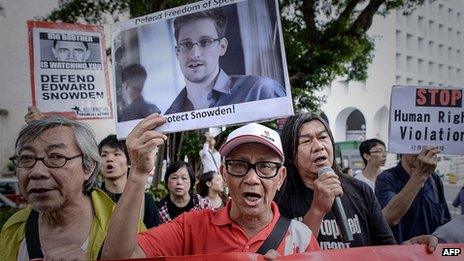Edward Snowden: Futile flight from Moscow to Caracas via Havana
- Published
Journalists look for Mr Snowden on board a flight to Havana, however, seat 17a remains empty
From the outside, the life of a foreign correspondent might sometimes seem insufferably glamorous.
But the hunt for Edward Snowden is one of those assignments where the limited glamour of Havana and Caracas airports on a Monday night have been vastly outweighed by economy-class legs and sleep deprivation.
The news that Edward Snowden had chosen to add further mystery to one of the great intelligence stories of our time - by paying a visit to America's old enemy Russia - had broken during a rare quiet Sunday for the Moscow press corps.
By mid-afternoon we were all assembled at Sheremetyevo Airport, where information was surprisingly forthcoming. Aeroflot employees confirmed that Edward Snowden had arrived in Moscow from Hong Kong.

The target: Believed to be still in Moscow
So, more in hope than expectation, we gathered in the arrivals hall of Terminal F. We were not optimistic. Surely he would only make a brief transit stop in Moscow? He would not want to be accused of selling secrets to Russia, would he?
That evening the Ecuadorean ambassador to Moscow showed up at the airport and asked us where Edward Snowden might be. Our frustrated reply: "We assumed you knew!"
The rest of the evening was spent hunting around airport hotels, asking if anyone had seen one of America's most wanted men. Inevitably, no-one had.
By late Sunday night it was clear that Edward Snowden had applied for asylum in Ecuador. Again, Aeroflot employees were helpful. They said that he had a connection on Monday to Havana in Cuba and on to Caracas in Venezuela, only a short hop from Ecuador.
Gently chaotic
A hard core of Moscow journalists re-assembled back at the airport the next morning. When someone is trying to avoid the press as they travel around the world, one of the choke-points is the aircraft itself. So some two dozen of us had booked seats on the Havana flight. This was finally our chance to talk to Edward Snowden on our terms, not his.
Some photographers even booked business class seats. Unfortunately, your intrepid correspondent was by the toilets at the back.

Hong Kong misses Edward Snowden
The Russian citizens among us were only travelling as far as Cuba, but the rest of us, lacking the necessary visas, had to connect through to Venezuela.
At the gate it was gently chaotic. Russian police officers warned us that if anyone filmed at the airport, we would have our cameras taken off us. This was no time to disobey. The stakes were too high. So we waited, and then meekly boarded the plane.
We knew that Edward Snowden's original reservation had him in seat 17A in economy, so the most enterprising journalists secured seats nearby.
We waited.
We were told there were just three passengers left to board. But it turned out that they were just journalists being off-loaded for not having the correct visas.
We waited some more.
And then, with our hearts sinking, the doors closed. Frantic searches around the aircraft confirmed that Edward Snowden was nowhere to be seen. Urgent enquiries to the crew further confirmed that no, he was not in the cockpit.
And so, with journalists surreptitiously sending SMS messages to their offices, flight SU150 took off for Cuba with seat 17A still empty.
Edward Snowden is still in Russia - at least we think he is. No-one has actually seen him. Speculation is mounting that he will have to pay a price to leave, payable in information. He has something the Russians want - details of America's electronics surveillance programmes.
Meanwhile, we are in an airport hotel in Caracas, overlooked by a Venezuelan slum, with stiff legs and dark rings under our eyes. We will be heading back to Moscow on economy class again. Unless, of course, Edward Snowden breaks cover once more.